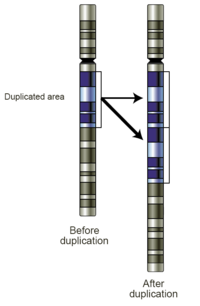
Photo from wikipedia
Genomic-scale somatic copy number alterations in healthy humans are difficult to investigate because of low occurrence rates and the structural variations' stochastic natures. Using a Tn5-transposase-assisted single-cell whole-genome sequencing method,… Click to show full abstract
Genomic-scale somatic copy number alterations in healthy humans are difficult to investigate because of low occurrence rates and the structural variations' stochastic natures. Using a Tn5-transposase-assisted single-cell whole-genome sequencing method, we sequenced over 20,000 single lymphocytes from 16 individuals. Then, with the scale increased to a few thousand single cells per individual, we found that about 7.5% of the cells had large-size copy number alterations. Trisomy 21 was the most prevalent aneuploid event among all autosomal copy number alterations, whereas monosomy X occurred most frequently in over-30-yr-old females. In the monosomy X single cells from individuals with phased genomes and identified X-inactivation ratios in bulk, the inactive X Chromosomes were lost more often than the active ones.
Journal Title: Genome research
Year Published: 2021
Link to full text (if available)
Share on Social Media: Sign Up to like & get
recommendations!